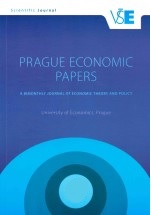Symmetric or Asymmetric: How is Economic Growth Responding to Global Economic Uncertainty in Africa’s Oil Exporters?
Symmetric or Asymmetric: How is Economic Growth Responding to Global Economic Uncertainty in Africa’s Oil Exporters?
Author(s): Jonathan E. Ogbuabor, Oliver E. Ogbonna, Onyinye I. Anthony-Orji, Davidmac O. Ekeocha, Obed I. OjontaSubject(s): National Economy, Supranational / Global Economy, Energy and Environmental Studies, Economic development
Published by: Vysoká škola ekonomická v Praze
Keywords: global economic uncertainty; economic growth; oil exporters; nonlinear ARDL model; Africa;
Summary/Abstract: Motivated by the persistent fall in oil prices due to incessant uncertainty-inducing events in recent years, this study empirically examined if economic growth in Africa’s top five oil exporters (Algeria, Angola, Egypt, Libya, and Nigeria) is responding asymmetrically to changes in global economic uncertainty as well as uncertainties from U.S., Europe and China using nonlinear ARDL framework from 1997Q1 to 2021Q4. We find that rising global uncertainty hampers economic growth in these economies, while declining global uncertainty significantly enhances growth in Nigeria, Angola and Libya in the short run, but becomes growth-retarding in the long run. Thus, economic growth responds asymmetrically to global uncertainty, especially in the short run. The findings are robust to U.S., Europe, and China uncertainties, except that economic growth in Libya and Algeria remained unresponsive to U.S. and China uncertainties respectively. We concluded that Africa’s oil exporters should embrace policies that can strengthen their resilience to global economic uncertainty as well as uncertainties from U.S., Europe, and China.
Journal: Prague Economic Papers
- Issue Year: 32/2023
- Issue No: 4
- Page Range: 446-472
- Page Count: 27
- Language: English

